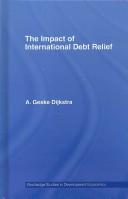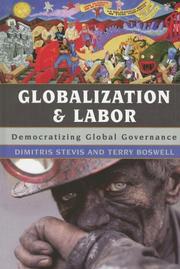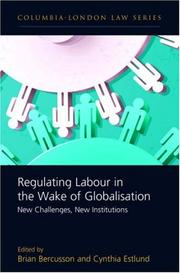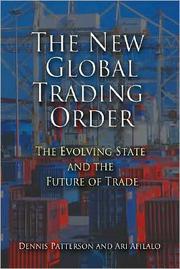| Listing 1 - 7 of 7 |
Sort by
|

ISBN: 0415414571 9780415414579 9780203936238 9781134121588 9781134121625 9781134121632 9780415748377 Year: 2008 Publisher: London Routledge
Abstract | Keywords | Export | Availability | Bookmark
 Loading...
Loading...Choose an application
- Reference Manager
- EndNote
- RefWorks (Direct export to RefWorks)
Developing countries: economic development problems --- Debt relief --- Development economics --- #SBIB:327.4H72 --- #SBIB:327.7H43 --- #SBIB:33H071 --- Economics --- Economic development --- Noord-Zuid verhouding --- Specifieke internationale organisaties en samenwerking: economie --- Economische internationale betrekkingen

ISBN: 9780742537842 9780742537859 0742537846 0742537854 Year: 2008 Publisher: Lanham, Md Rowman & Littlefield Publishers, Inc.
Abstract | Keywords | Export | Availability | Bookmark
 Loading...
Loading...Choose an application
- Reference Manager
- EndNote
- RefWorks (Direct export to RefWorks)
Labour economics --- International economic relations --- Economic relations. Trade --- Corporate governance --- Globalization --- International labor activities --- Labor policy --- Labor unions --- Social justice --- #SBIB:316.334.2A419 --- #SBIB:327.7H43 --- Equality --- Justice --- Labor --- State and labor --- Economic policy --- Labor activities, International --- Governance, Corporate --- Industrial management --- Directors of corporations --- Economic aspects --- Political activity --- Arbeidssociologie: Europees en wereldsyndicalisme --- Specifieke internationale organisaties en samenwerking: economie --- Government policy --- International cooperation
Book
ISBN: 9780231140485 9780231512961 0231140487 0231512961 Year: 2008 Publisher: New York : Columbia University Press,
Abstract | Keywords | Export | Availability | Bookmark
 Loading...
Loading...Choose an application
- Reference Manager
- EndNote
- RefWorks (Direct export to RefWorks)
Progressive governments in poor countries fear that if they undertake measures to enhance real wages and working conditions, rising labor costs would cause wealthier countries to import from and invest elsewhere. Yet if the world trading system were designed to facilitate or even reward measures to promote labor standards, poor countries could undertake them without fear.In this book, Christian Barry and Sanjay G. Reddy propose ways in which the international trading system can support poor countries in promoting the well-being of their peoples. Reforms to the trading system can lessen the collective-action problem among poor countries, increasing their freedom to pursue policy that better serves the interests of their people. Incorporating the right kind of linkage between trading opportunities and the promotion of labor standards could empower countries, allowing them greater effective sovereignty and enabling them to improve the circumstances of the less advantaged. Barry and Reddy demonstrate how linkage can be made acceptable to all players, and they carefully defend these ideas against those who might initially disagree. Their volume is accessible to general readers but draws on sophisticated economic and philosophical arguments and includes responses from leading labor activists, economists, and philosophers, including Kyle Bagwell, Robert Goodin, Rohini Hensman, and Roberto Mangabeira Unger.
International trade. --- Labor laws and legislation, International. --- Labor --- Commerce international --- Travail --- Standards. --- Droit international --- Normes --- International trade --- Labor laws and legislation, International --- Standards --- #SBIB:33H071 --- #SBIB:327.7H43 --- Economische internationale betrekkingen --- Specifieke internationale organisaties en samenwerking: economie --- Labor and laboring classes --- Manpower --- Work --- Working class --- International labor laws and legislation --- International law --- External trade --- Foreign commerce --- Foreign trade --- Global commerce --- Global trade --- Trade, International --- World trade --- Commerce --- International economic relations --- Non-traded goods --- Labor - Standards --- Labor laws and legislation.

ISBN: 9781841137667 1841137669 Year: 2008 Publisher: Oxford: Hart,
Abstract | Keywords | Export | Availability | Bookmark
 Loading...
Loading...Choose an application
- Reference Manager
- EndNote
- RefWorks (Direct export to RefWorks)
International law --- Social law. Labour law --- Labor laws and legislation --- Labor laws and legislation, International --- Law and globalization --- Globalization and law. --- Labor laws and legislation, International. --- Labor laws and legislation. --- Law and globalization. --- #SBIB:316.334.2A440 --- #SBIB:340H11 --- #SBIB:327.7H43 --- Globalization and law --- Globalization --- International labor laws and legislation --- Employees --- Employment law --- Industrial relations --- Labor law --- Labor standards (Labor law) --- Work --- Working class --- Industrial laws and legislation --- Social legislation --- Arbeidssociologie: het strategisch optreden van de partijen in de collectieve arbeidsverhoudingen: algemeen --- Arbeidsrecht: algemeenheden, sociale wetgeving --- Specifieke internationale organisaties en samenwerking: economie --- Legal status, laws, etc. --- Law and legislation
Book
ISBN: 9780521727211 9780521898614 9780511720567 9781107322189 1107322189 0511720564 0521898617 0521727219 1139810782 1107202159 1107316790 1107318688 1107317762 129939986X 1107315832 Year: 2008 Publisher: Cambridge, UK New York Cambridge University Press
Abstract | Keywords | Export | Availability | Bookmark
 Loading...
Loading...Choose an application
- Reference Manager
- EndNote
- RefWorks (Direct export to RefWorks)
Money is a social convention, but with what social consequences? In this innovative study, Rodney Bruce Hall argues that those who govern the parameters of money's creation, its destruction, and its valuation are responsible for the governance of international finance. The volume is an analysis of central banking as global governance, employing the institutional philosophy of John Searle as a theoretical basis for exploring the consequences of money as a social institution, and the social relations of credit and debt. While previous studies in this field have made forays into the political economy of monetary institutions, this book breaks new ground by offering a constructivist social analysis that identifies the mechanisms of governance as social rather than material processes. The volume will therefore be of great interest to a wide range of scholars and students, particularly those with an interest in international relations, international finance and international political economy.
Banks and banking, Central. --- Corporate governance. --- AA / International- internationaal --- 333.80 --- 333.846.0 --- 333.111.0 --- #SBIB:327.7H43 --- Banks and banking, Central --- Corporate governance --- 332.11 --- Governance, Corporate --- Industrial management --- Directors of corporations --- Banker's banks --- Banks, Central --- Central banking --- Central banks --- Banks and banking --- Geld-, bank- en kredietpolitiek. Kapitaalmarkt en -rente: algemeenheden. --- Verband tussen het monetair, bank- en kredietbeleid en de economische ontwikkeling: algemeenheden. --- Algemeenheden. Theoretische en beschrijvende studies. Centrale banken. --- Specifieke internationale organisaties en samenwerking: economie --- Algemeenheden. Theoretische en beschrijvende studies. Centrale banken --- Geld-, bank- en kredietpolitiek. Kapitaalmarkt en -rente: algemeenheden --- Verband tussen het monetair, bank- en kredietbeleid en de economische ontwikkeling: algemeenheden --- Social Sciences --- Political Science

ISBN: 9780521124683 9780521875189 0521875188 9780511551208 0521124689 1107181968 0511480466 0511551207 0511475810 0511477252 0511478771 9780511480461 0511479662 9780511479663 9780511474002 0511474008 9780511476525 0511476523 Year: 2008 Publisher: Cambridge New York Cambridge University Press
Abstract | Keywords | Export | Availability | Bookmark
 Loading...
Loading...Choose an application
- Reference Manager
- EndNote
- RefWorks (Direct export to RefWorks)
The international institutions that have governed global trade since the end of World War II have lost their effectiveness, and global trade governance is fractured. The need for new institutions is obvious, and yet, few proposals seem to be on offer. The key to understanding the global trading order lies in uncovering the relationship between trade and the State, and how the inner constitution of Statecraft drives the architecture of the global order and requires structural changes as the State traverses successive cycles. The current trade order, focused on the liberalization of trade in goods and services and the management of related issues, is predicated on policies and practices that were the product of a global trading order of the 20th-century modern nation-states. Today, a new form of the State - the post-modern State - is evolving. In this book, the authors propose a new trade norm - the enablement of global economic opportunity - and a new institution - the Trade Council - to overhaul the global trading order.
Foreign trade policy --- International finance --- United Nations Monetary and Financial Conference --- International economic relations --- International trade --- #SBIB:327.7H43 --- #SBIB:33H071 --- 382.11 --- AA / International- internationaal --- External trade --- Foreign commerce --- Foreign trade --- Global commerce --- Global trade --- Trade, International --- World trade --- Commerce --- Non-traded goods --- International monetary system --- International money --- Finance --- Economic policy, Foreign --- Economic relations, Foreign --- Economics, International --- Foreign economic policy --- Foreign economic relations --- Interdependence of nations --- International economic policy --- International economics --- New international economic order --- Economic policy --- International relations --- Economic sanctions --- Specifieke internationale organisaties en samenwerking: economie --- Economische internationale betrekkingen --- Theorie van het internationale evenwicht. Economische onafhankelijkheid van een natie. Globalisering. Mondialisering --- Bretton Woods Conference --- Conférence monétaire et financière des Nations Unies, --- Conferencia Monetaria Internacional de Bretton-Woods --- Conferencia Monetaria y Financiera de las Naciones Unidos --- Monetary and Financial Conference, United Nations --- Rengōkoku Tsūka Kinʼyū Kaigi --- United Nations Monetary & Financial Conference --- United nations monetary and financial conference, --- International economic relations. --- International finance. --- International trade. --- Law --- General and Others
Book
ISBN: 9780754626626 9780754626718 0754626717 9780754626756 9780754626688 9780754626657 9781315254166 9781351933216 9781315254227 9781351933391 Year: 2008 Publisher: Farnham Ashgate
Abstract | Keywords | Export | Availability | Bookmark
 Loading...
Loading...Choose an application
- Reference Manager
- EndNote
- RefWorks (Direct export to RefWorks)
International law --- Internationale financiën. --- Internationale financiële politiek. --- Internationale regelgeving --- #SBIB:35H432 --- Beleidssectoren: buitenlands beleid --- #SBIB:327.7H44 --- Specifieke internationale organisaties en samenwerking: gezondheid --- #SBIB:340H80 --- #SBIB:35H431 --- Law of nations --- Nations, Law of --- Public international law --- Law --- Internationaal recht, algemeen --- Beleidssectoren: binnenlands beleid en justitie --- Globalization --- Public health --- World health --- #SBIB:316.334.3M50 --- #SBIB:35H436 --- Global health --- International health --- Medical geography --- International agencies --- Medical assistance --- Public health laws, International --- Health aspects --- International cooperation --- Organisatie van de gezondheidszorg: algemeen, beleid --- Beleidssectoren: welzijn, volksgezondheid en cultuur --- AA / International- internationaal --- #SBIB:35H435 --- #SBIB:35H220 --- 330.00 --- 382.20 --- 333.450 --- Beleidssectoren: economisch en werkgelegenheidsbeleid --- Financieel management bij de overheid: algemene werken --- Economische en sociale theorieën: algemeenheden. --- Internationale betalingen en betalingsbalans: algemeenheden. --- Theorie van het deviezenverkeer. Theorie van de koopkrachtpariteit. --- Commercial policy --- Foreign trade regulation --- International trade --- #SBIB:327.7H43 --- #SBIB:33H072 --- 334.81 --- 382.0 --- 382.10 --- 382.30 --- External trade --- Foreign commerce --- Foreign trade --- Global commerce --- Global trade --- Trade, International --- World trade --- Commerce --- International economic relations --- Non-traded goods --- Export and import controls --- Foreign trade control --- Import and export controls --- International trade control --- International trade regulation --- Prohibited exports and imports --- Trade regulation --- Foreign trade policy --- International trade policy --- Trade policy --- Economic policy --- Specifieke internationale organisaties en samenwerking: economie --- Wereldmarkten --- Wereldhandelsorganisatie (WHO). Algemene overeenkomst voor handel en tarieven (GATT) --- Algemeenheden. Techniek en praktijk van de internationale handel. Internationale economische betrekkingen --- Theorieën van internationale en interregionale handel: algemeenheden. Comparatieve voordelen --- Handels- en wisselpolitiek in hun verband met de buitenlandse handel: algemeenheden --- Law and legislation --- Government policy --- #SBIB:327.7H01 --- #SBIB:327.7H06 --- Grondslagen, principes, evolutie internationale gemeenschap --- Internationale organisatietheorieën --- International finance --- Government policy. --- Law and legislation. --- Economische en sociale theorieën: algemeenheden --- Internationale betalingen en betalingsbalans: algemeenheden --- Theorie van het deviezenverkeer. Theorie van de koopkrachtpariteit --- Marche des capitaux --- Internationale financiële politiek. --- Internationale financiën.
| Listing 1 - 7 of 7 |
Sort by
|

 Search
Search Feedback
Feedback About UniCat
About UniCat  Help
Help News
News